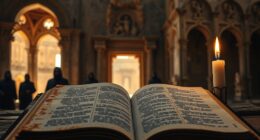Mary, the Mother of Jesus, has a genealogy that's often inferred rather than explicitly stated. You'll find references in Luke 3:23-38 that connect her to the Davidic line, suggesting her royal lineage. Many believe Mary descended from King David through her parents, Joachim and Anne. Traditional Jewish practices typically traced lineage through males, which adds some complexity to Mary's ancestry. Understanding her lineage enriches the context of Jesus' birth and messianic claims. If you explore further, you'll uncover fascinating details about her significance and connections within scripture.
Key Takeaways
- Mary's genealogy is primarily inferred, with significant connections to David suggested in Luke 3:23-38, emphasizing her royal lineage.
- Early Christian tradition supports Mary's descent from David, often attributing her parents as Joachim and Anne from the Davidic line.
- Jewish genealogical practices traditionally focused on paternal lineage, complicating the understanding of Mary's ancestry and tribal identity.
- Celebrations of Mary's royal bloodline reinforce her significance in salvation history and highlight her role as the mother of Jesus.
- Theological resources and early writings provide insights into Mary's ancestry, though discrepancies in genealogies raise questions about historical accuracy.
Introduction
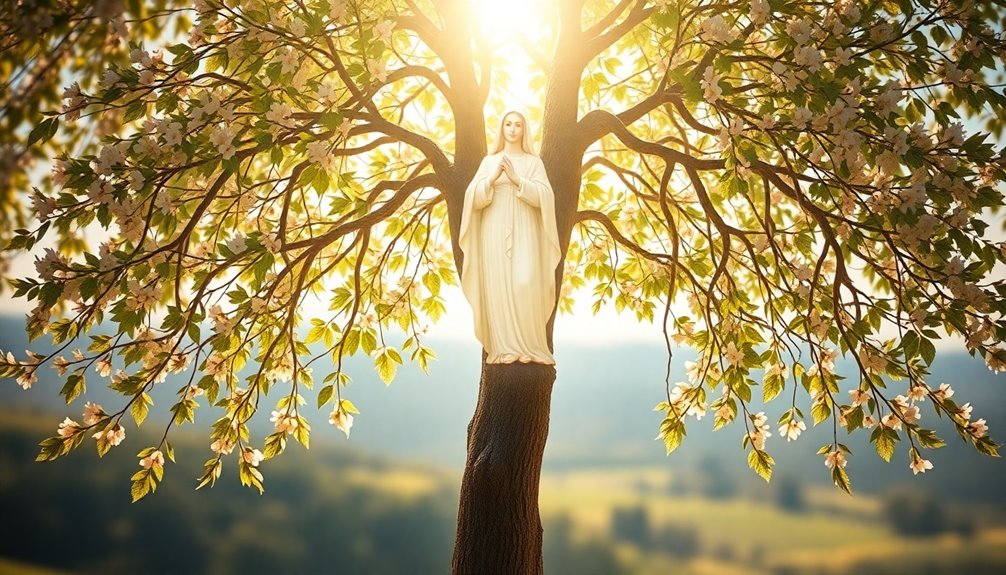
When exploring the genealogy of Mary, the mother of Jesus, it's important to note that much of what we know comes from inference rather than explicit scripture. The most notable reference appears in Luke 3:23-38, which outlines a genealogy that many scholars believe connects Mary to David, even if it doesn't directly name her.
Some argue that "Joseph of Heli" could indicate Mary's lineage, as the Greek allows for interpretations suggesting biological descent.
Tradition holds that Mary is descended from David through her father, reinforcing her connection to the Davidic line, which is significant for affirming Jesus' messianic claims. This lineage is crucial since, according to Jewish tradition, the Messiah was prophesied to come from David's line.
However, the absence of a detailed genealogical mention of Mary leads to debates about her tribal identity and the implications for Jesus' own lineage.
Despite these complexities, particularly due to the virgin birth narrative, the belief in Mary's Davidic ancestry remains strong among early Christian writings and church traditions, shaping how you understand the context and significance of Jesus' life and mission.
Davidic Lineage of Mary

When exploring Mary's Davidic lineage, you'll find key references in both Luke and Matthew's genealogies.
Luke's account hints at her connection through Nathan, while Matthew emphasizes Joseph's legal lineage.
Understanding these primary and secondary references helps clarify Mary's significant role in fulfilling the Messianic prophecies.
Primary Bible References
Tracing the lineage of Mary reveals her significant connection to the Davidic line, which is crucial for understanding Jesus' royal status. In Luke 3:23-34, you see the genealogy in Luke that traces Jesus' ancestry, often interpreted as Mary's lineage. This passage highlights that Jesus is a descendant of David, specifically through David's son Nathan, rather than Solomon.
The angel Gabriel emphasizes this royal connection in Luke 1:32, where he states that Jesus will inherit the throne of His father David. This link to the Davidic line is essential for acknowledging Mary's role in Jesus' heritage.
Furthermore, Luke 3:34-33 identifies Mary as a descendant of Abraham, Isaac, Jacob, and the tribe of Judah, reinforcing her connection to David.
Though the New Testament doesn't explicitly detail Mary's genealogy, early Christian tradition supports her Davidic heritage, as seen in apocryphal texts like the Gospel of James.
While some scholars debate the biological connection to David through Mary, it's clear that the legal lineage through Joseph's father still plays a significant role in establishing Jesus' royal lineage.
Secondary Bible References
The genealogy presented in the Gospel of Luke provides a foundation for understanding Mary's connection to the Davidic lineage. Some scholars argue that this genealogy traces back to Mary's father, Heli, emphasizing her descent from notable figures like Boaz and David. This connection is crucial for affirming Jesus' messianic credentials, as it aligns with prophecies about the Messiah coming from the Davidic throne.
While the New Testament doesn't explicitly document Mary's lineage, early Christian writings and traditions consistently assert that she descended from David. This assertion is significant because it underscores the theological necessity for Jesus to fulfill the prophecies concerning the Messiah's ancestry.
Moreover, Joseph's genealogy, which also traces back to David, further reinforces this connection, as Joseph acted as Jesus' earthly father.
The tradition of Mary being of Davidic lineage has endured through various church doctrines and teachings, despite the absence of direct biblical evidence. This enduring belief highlights the importance of Mary's heritage in the context of Jesus' identity as the Messiah, weaving together the themes of lineage and prophecy in the Christian faith.
Jewish Lineage Tracing Practices

In ancient Jewish culture, lineage tracing primarily focused on paternal lines, making it crucial for establishing tribal identity. This means that genealogies typically emphasized the male lineage, often omitting women's contributions.
So, when looking at Mary's lineage, you'll find that it's not explicitly detailed in the genealogies of Matthew and Luke, as they're primarily traced through Joseph's line, even though he wasn't her biological father.
Under traditional Jewish law, maternal lineage didn't confer tribal identity. The cultural norms of the time reflected a strong preference for patrilineal descent. Even the levirate marriage law underscores the importance of continuing a family line through males, further sidelining the maternal aspect.
Adoption, while rare, also didn't typically grant tribal affiliation, maintaining the focus on biological descent through the father.
The absence of a clear, documented lineage for Mary in the New Testament highlights how women's genealogies weren't regarded with the same significance as men's. This practice illustrates the broader societal values of ancient Israel, where the male line defined identity and heritage.
Mary's Royal Ancestry Evidence

Throughout biblical history, Mary's royal ancestry plays a pivotal role in affirming Jesus' messianic credentials. As a descendant of King David, Mary fulfills the prophetic requirement for the Messiah's lineage, as highlighted in Luke 1:32-33, where the angel Gabriel confirms Jesus' royal heritage.
In Luke 3:34, you see her genealogy tracing back to Abraham, Isaac, and Jacob, emphasizing her deep roots within Israel's patriarchal legacy.
Some interpretations suggest that the genealogy in Luke 3, which refers to Jesus as the son of Joseph, actually traces through Mary, linking Jesus to David's line via her father, Heli. This connection is crucial because it underscores the belief that Mary's royal ancestry validates Jesus' claim to Messiahship.
While early church traditions propose that her parents, Joachim and Anne, belonged to David's lineage, this isn't explicitly documented in Scripture.
Still, the significance of Mary's royal ancestry remains clear. It highlights the extraordinary nature of Jesus' birth and solidifies His position in fulfilling the promises made to Israel, bridging the gap between divine prophecy and earthly lineage.
Mary's Lineage and Royalty

When you explore Mary's lineage, you might encounter common misconceptions about her royal connections.
It's crucial to consider the historical accuracy of these claims, especially given the debates among scholars.
Debunk Common Misconceptions
Misunderstanding often clouds the discussion surrounding Mary's lineage and its supposed royal connections. Many people assume Mary's ancestry ties her directly to King David, but there's no explicit scriptural evidence in the New Testament to confirm this.
The genealogies of Jesus presented in Matthew and Luke mainly trace through Joseph, which can lead to misconceptions about Mary's own genealogy and royal status. While some scholars speculate that Luke's genealogy might reflect Mary's lineage, the text itself doesn't definitively attribute royal descent to her.
It's also important to note that under Jewish law, matrilineal descent doesn't confer tribal identification, meaning that any potential Davidic ancestry Mary may have had wouldn't automatically grant Jesus royal status.
Moreover, the claims regarding Mary's lineage are often rooted in later church doctrine rather than clear biblical evidence. This ambiguity contributes to ongoing debates about her ancestry.
In essence, while Mary is revered, the notion of her being a royal descendant remains largely speculative and unsubstantiated, reminding us to be cautious about the misconceptions surrounding her lineage.
Historical Accuracy Concerns
Mary's lineage has long been a subject of scrutiny, especially when it comes to claims of her royal connections. The discrepancies between the genealogies of Jesus in Matthew and Luke raise significant historical accuracy concerns. Luke presents Heli as Mary's father, but this relationship isn't explicitly stated, leading to debates among scholars. Many argue that if Mary was a descendant of David, it should be more clearly documented.
Without a direct mention of Mary's genealogy in the New Testament, uncertainty lingers regarding her royal lineage and tribal identification. In Jewish law, matrilineal descent isn't recognized, complicating claims about her ancestry. Early Church traditions suggest that Mary belonged to the royal line of David, yet the lack of historical documentation weakens these assertions.
Moreover, the complexities surrounding genealogical claims, especially in light of Jesus' virgin birth narrative, further highlight the challenges in establishing a definitive historical lineage for Mary. The notion that Jesus is legally tied to the tribe of Judah through Mary's lineage is appealing, but without solid evidence, these claims remain speculative at best.
Royal Bloodline Significance
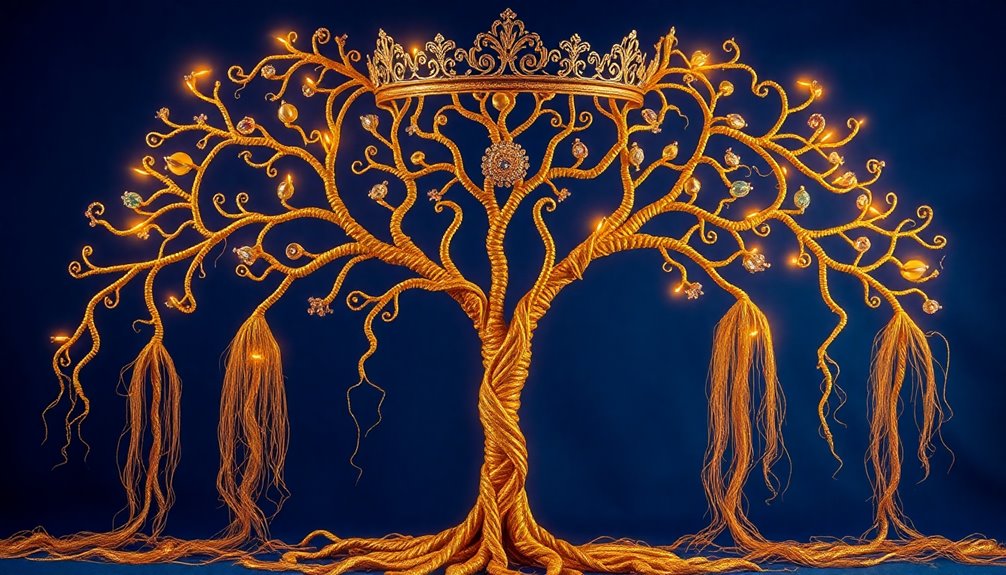
Recognizing the royal heritage in Mary's genealogy can inspire you to celebrate your own community's history and contributions.
By understanding how this lineage impacts the identity of Jesus, you can appreciate the significance of royal bloodlines today.
Embracing these connections not only honors the past but also enriches your present and future.
Embracing Royal Heritage Today
Connecting with a royal heritage today can profoundly impact how believers view their spiritual identity. When you understand that Mary was a cousin of Elizabeth and a descendant of David, you realize that Jesus Christ's claim to the Davidic throne isn't just historical; it's personal. This royal lineage emphasizes that you're spiritually connected to a legacy of kingship and fulfillment of Messianic prophecies.
Embracing this concept, you recognize that Jesus isn't merely a figure from the past but your King of Kings. Knowing Mary's bloodline reinforces the significance of lineage in understanding Jesus' identity and mission. It invites you to reflect on the implications of being part of a royal heritage. You become part of a story that transcends time, where the divine purpose unfolds through generations.
Moreover, this connection encourages you to live with a sense of dignity and purpose, understanding your place in a grand narrative. By embracing your royal heritage, you align yourself with the values and responsibilities that come with it, empowering you to reflect the love and authority of Jesus in your everyday life.
This realization can transform your spiritual journey into one of royal significance.
Community Heritage Celebrations
Community heritage celebrations play a vital role in acknowledging the significance of Mary's royal bloodline, highlighting her descent from David and the fulfillment of messianic prophecies. These events provide an opportunity for you and your community to reflect on Mary's lineage and its importance in affirming Jesus' identity as the rightful heir to David's throne.
By focusing on her connection to key biblical figures such as Abraham and David, these celebrations reinforce her role within the broader narrative of salvation history.
During these festivities, you might engage in storytelling, hymns, and rituals that honor Mary's heritage. This fosters a deeper connection to biblical history and emphasizes the divine plan where Jesus, born of a woman from the Davidic line, embodies both royal and humble origins.
Celebrating Mary's lineage not only enriches your understanding of her life but also strengthens communal bonds, as everyone shares in the recognition of the fulfillment of God's promises.
Ultimately, these heritage celebrations serve as a powerful reminder of the profound significance of Mary's royal bloodline in the context of faith and identity within the community.
Mary's Lineage Affirms Royal Descent
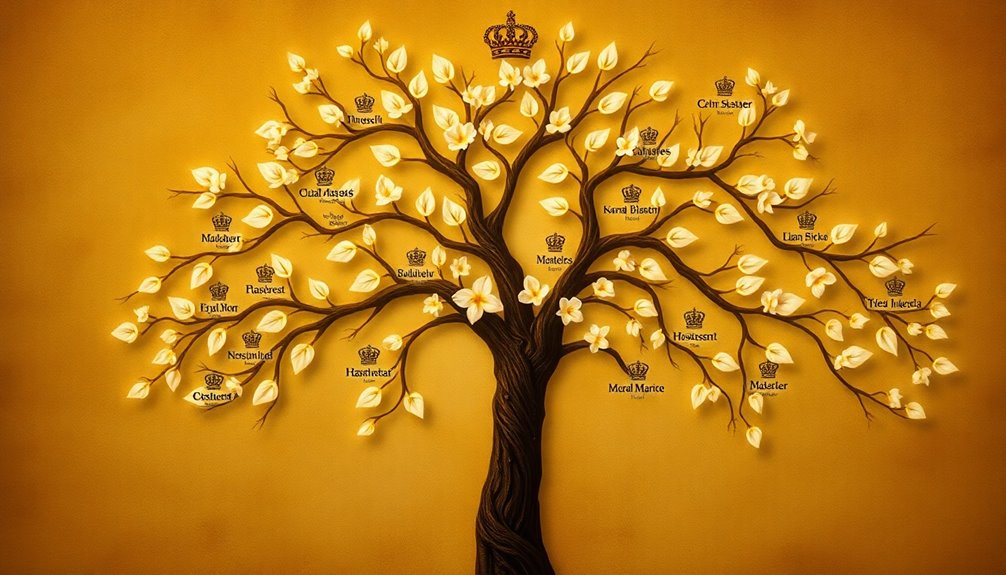
Mary's lineage is a crucial aspect of understanding Jesus' royal descent. Traditionally believed to be a descendant of King David, Mary's genealogy affirms Jesus' rightful claim to the Davidic throne. In Luke 3:23-38, the genealogies trace Jesus' ancestry back to David through Nathan, emphasizing the connection between Mary and this royal lineage. The angel Gabriel's announcement in Luke 1:32 highlights the significance of this heritage, reinforcing that Jesus is destined for greatness as the Messiah.
Mary's notable ancestors include significant figures like Abraham, Isaac, Jacob, and Boaz, each contributing to her royal lineage. This ancestry not only enhances Mary's identity but also plays a vital role in Christian theology, establishing Jesus as the long-awaited Messiah.
Understanding Mary's lineage helps you appreciate the fulfillment of prophecies in the Hebrew Scriptures regarding the coming of a king from David's line.
In examining Mary's genealogy, you find a powerful link between her bloodline and the divine mission of Jesus. This royal descent enriches the narrative of Jesus' life and purpose, affirming his identity as the promised Savior and rightful heir to David's legacy.
Additional Resources
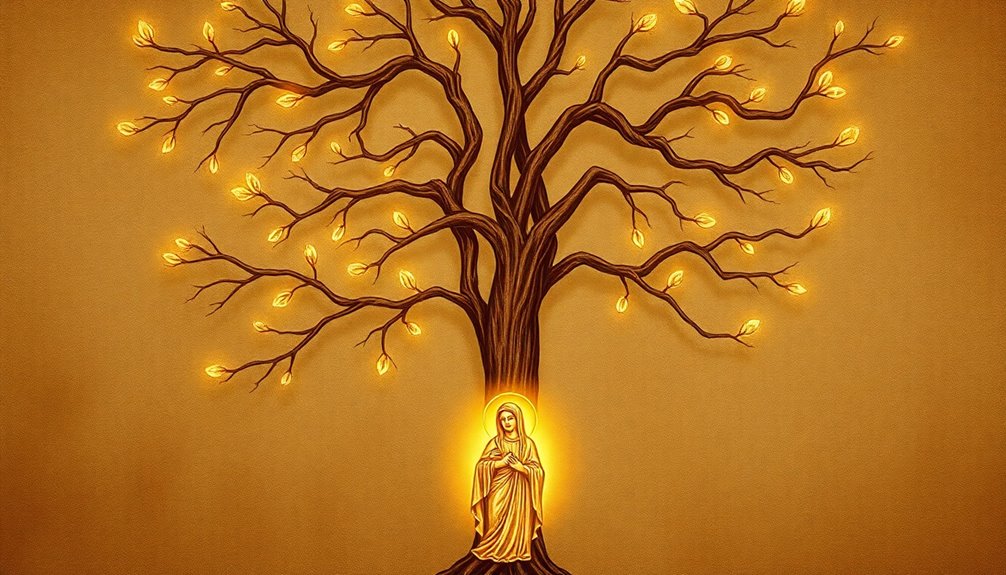
To deepen your understanding of Mary's lineage and its significance, there are several resources that can provide valuable insights. One effective starting point is the Gospel of Luke, where you can explore the genealogy that many scholars believe traces Mary's lineage back to David through her father, Heli.
While the New Testament doesn't explicitly detail her ancestry, this genealogy highlights her royal descent.
Additionally, consider delving into early Christian writings and traditions that mention Mary's parents, Joachim and Anne. Although historical evidence about them is scarce, these texts can offer a glimpse into how early Christians viewed Mary's lineage.
You might also examine the connections between Mary and Elizabeth, who was married to a priest. This relationship suggests possible Levitical ties in Mary's genealogy, adding another layer of significance to her lineage.
For a deeper theological perspective, resources from the Catholic Church can clarify the importance of Mary's ancestry in relation to Jesus' messianic claims.
Frequently Asked Questions
What Was the Genealogy of Mary, Mother of Jesus?
When you explore the genealogy of a significant figure, you often find that records can be incomplete or debated.
In Mary's case, while some traditions suggest her lineage traces back to David, the Bible doesn't provide a direct genealogy for her.
Scholars look at passages like Luke 3:23-38 for clues, but interpretations vary.
You might notice that the lack of clarity adds to the intrigue surrounding her ancestry and its implications.
What Book of the Bible Is Mary's Genealogy?
You'll find Mary's genealogy in the Gospel of Luke, specifically in Luke 3:23-38. This passage traces Jesus' lineage back to Adam, highlighting the universal significance of his heritage.
While some scholars believe this genealogy reflects Mary's ancestry, it primarily emphasizes Jesus' connection to humanity.
Unlike Matthew's account, which focuses on Joseph's lineage, Luke's version is thought to illustrate a deeper biological link to David through Mary.
Who Are the Biological Parents of Mary Mother of Jesus?
You might find that the biological parents of Mary, the mother of Jesus, are traditionally identified as Joachim and Anne.
While historical evidence for their existence is limited, early church traditions and texts like the Gospel of James suggest Joachim descended from David.
The Catholic Church honors them as saints, celebrating their feast day on July 26.
However, the lack of direct biblical references means this lineage remains a topic of debate.
Where in the Bible Does It Say Mary Was a Descendant of David?
You mightn't find a direct statement in the Bible declaring Mary as a descendant of David, but you can infer it through Jesus' genealogy.
In the Gospel of Luke, the lineage traces Jesus back to David, suggesting that Mary, as His mother, shares that ancestry.
The angel Gabriel also highlights Jesus' royal connection to David, further implying Mary's significance in that lineage.
Both Matthew and Luke ultimately connect Jesus to David, which supports this understanding.










